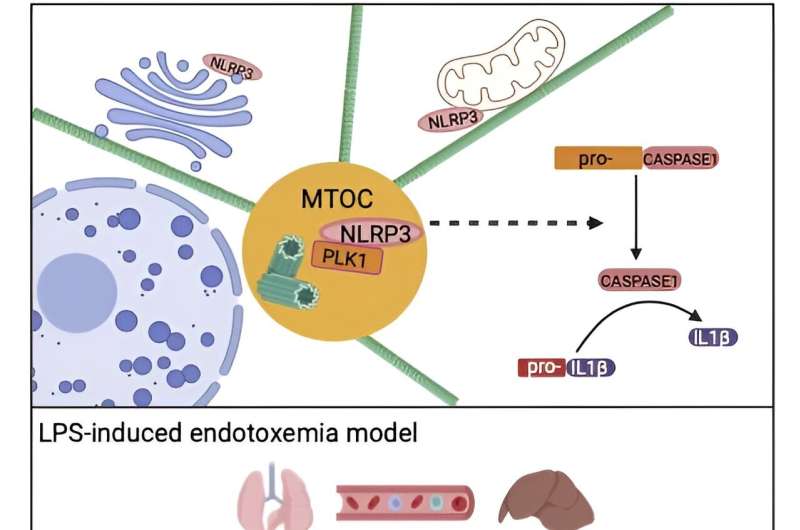This article has been reviewed according to Science X's editorial process and policies. Editors have highlighted the following attributes while ensuring the content's credibility:
fact-checked
peer-reviewed publication
trusted source
proofread
Cancer drug could hold hope for treating inflammatory diseases including gout and heart diseases

A cancer drug currently in the final stages of clinical trials could offer hope for the treatment of a wide range of inflammatory diseases, including gout, heart failure, cardiomyopathy, and atrial fibrillation, say scientists at the University of Cambridge.
In a study, titled "PLK1 inhibition dampens NLRP3 inflammasome-elicited response in inflammatory disease model," published in the Journal of Clinical Investigation, researchers have identified a molecule that plays a key role in triggering inflammation in response to materials in the body seen as potentially harmful.
We are born with a defense system known as innate immunity, which acts as the first line of defense against harmful materials in the body. Some of these materials will come from outside, such as bacterial or viral infections, while others can be produced within the body.
Innate immunity triggers an inflammatory response, which aims to attack and destroy the perceived threat. But sometimes, this response can become overactive and can itself cause harm to the body.
One such example of this is gout, which occurs when urate crystals build up in joints, causing excessive inflammation, leading to intense pain. Another example is heart attack, where dead cell build up in the damaged heart—the body sees itself as being under attack and an overly-aggressive immune system fights back, causing collateral damage to the heart.
Several of these conditions are characterized by over-activation of a component of the innate immune response known as an inflammasome—specifically, the inflammasome NLRP3. Scientists at the Victor Phillip Dahdaleh Heart and Lung Research Institute at Cambridge have found a molecule that helps NLRP3 respond.
This molecule is known as PLK1. It is involved in a number of processes within the body, including helping organize tiny components of our cells known as microtubules cytoskeletons. These behave like train tracks inside of the cell, allowing important materials to be transported from one part of the cell to another.
Dr. Xuan Li from the Department of Medicine at the University of Cambridge, the study's senior author, said, "If we can get in the way of the microtubules as they try to organize themselves, then we can in effect slow down the inflammatory response, preventing it from causing collateral damage to the body. We believe this could be important in preventing a number of common diseases that can cause pain and disability and in some cases can lead to life-threatening complications."
But PLK1 also plays another important role in the body—and this may hold the key to developing new treatments for inflammatory diseases.
For some time now, scientists have known that PLK1 is involved in cell division, or mitosis, a process which, when it goes awry, can lead to runaway cell division and the development of tumors. This has led pharmaceutical companies to test drugs that inhibit its activity as potential treatments for cancer. At least one of these drugs is in phase three clinical trials—the final stages of testing how effective a drug is before it can be granted approval.
When the Cambridge scientists treated mice that had developed inflammatory diseases with a PLK1 inhibitor, they showed that it prevented the runaway inflammatory response—and at a much lower dose than would be required for cancer treatment. In other words, inhibiting the molecule 'calmed down' NLRP3 in non-dividing cells, preventing the overly aggressive inflammatory response seen in these conditions.
The researchers are currently planning to test its use against inflammatory diseases in clinical trials.
"These drugs have already been through safety trials for cancer—and at higher doses than we think we would need—so we're optimistic that we can minimize delays in meeting clinical and regulatory milestones," added Dr. Li.
"If we find that the drug is effective for these conditions, we could potentially see new treatments for gout and inflammatory heart diseases—as well as a number of other inflammatory conditions—in the not-too-distant future."
Professor James Leiper, Associate Medical Director at the British Heart Foundation said, "This innovative research has uncovered a potential new treatment approach for inflammatory heart diseases such as heart failure and cardiomyopathy. It's promising that drugs targeting PLK1—that work by dampening down the inflammatory response—have already been proven safe and effective in cancer trials, potentially helping accelerate the drug discovery process.
"We hope that this research will open the door for new ways to treat people with heart diseases caused by overactive and aggressive immune responses, and look forward to more research to uncover how this drug could be could be repurposed."
More information: Marta Baldrighi et al, PLK1 inhibition dampens NLRP3 inflammasome–elicited response in inflammatory disease models, Journal of Clinical Investigation (2023). DOI: 10.1172/JCI162129




















